ENTREPRENEURSHIP AND SMALL BUSINESS ENTERPRISE Report - UK Economy
VerifiedAdded on 2020/06/03
|13
|6584
|29
Report
AI Summary
This report delves into the realm of entrepreneurship and small business enterprises, examining various types of entrepreneurial ventures, including small, medium, and large enterprises, and social enterprises. It contrasts their similarities and differences, focusing on aspects like size, structure, aims, objectives, and sources of finance. The report further analyzes the impact of small businesses on the UK economy, emphasizing their contributions to employment, economic growth, and flexibility in changing conditions. It also explores the role of small businesses and start-ups in the social economy, particularly in light of Brexit and its effects on the UK economy. The analysis covers the significance of small business contributions to industrial revenue and the importance of fostering entrepreneurial responsibility. Overall, the report provides a comprehensive overview of the entrepreneurial landscape and its implications for the UK economy.

ENTREPRENEURSHIP AND
SMALL BUSINESS
ENTERPRISE
SMALL BUSINESS
ENTERPRISE
Paraphrase This Document
Need a fresh take? Get an instant paraphrase of this document with our AI Paraphraser
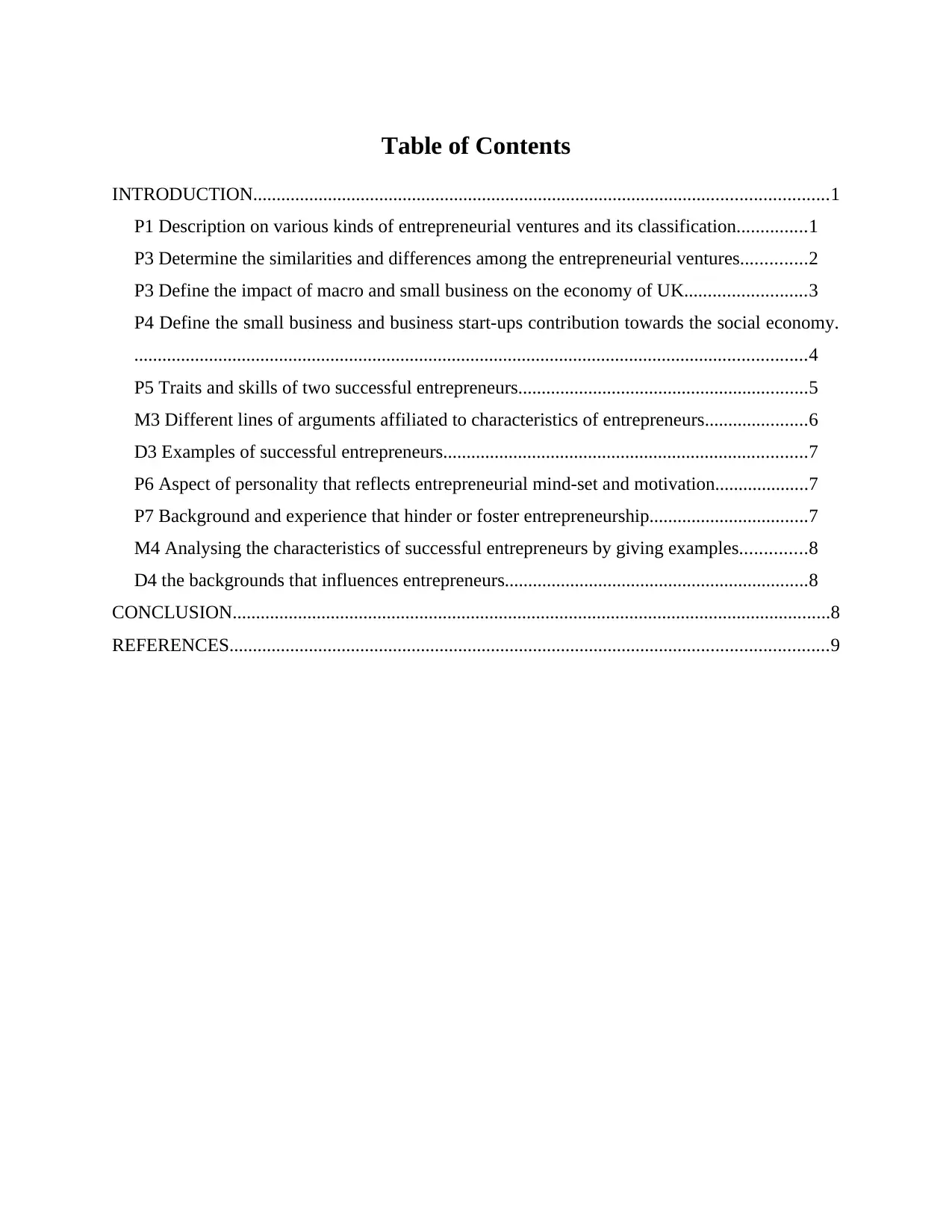
Table of Contents
INTRODUCTION...........................................................................................................................1
P1 Description on various kinds of entrepreneurial ventures and its classification...............1
P3 Determine the similarities and differences among the entrepreneurial ventures..............2
P3 Define the impact of macro and small business on the economy of UK..........................3
P4 Define the small business and business start-ups contribution towards the social economy.
................................................................................................................................................4
P5 Traits and skills of two successful entrepreneurs..............................................................5
M3 Different lines of arguments affiliated to characteristics of entrepreneurs......................6
D3 Examples of successful entrepreneurs..............................................................................7
P6 Aspect of personality that reflects entrepreneurial mind-set and motivation....................7
P7 Background and experience that hinder or foster entrepreneurship..................................7
M4 Analysing the characteristics of successful entrepreneurs by giving examples..............8
D4 the backgrounds that influences entrepreneurs.................................................................8
CONCLUSION................................................................................................................................8
REFERENCES................................................................................................................................9
INTRODUCTION...........................................................................................................................1
P1 Description on various kinds of entrepreneurial ventures and its classification...............1
P3 Determine the similarities and differences among the entrepreneurial ventures..............2
P3 Define the impact of macro and small business on the economy of UK..........................3
P4 Define the small business and business start-ups contribution towards the social economy.
................................................................................................................................................4
P5 Traits and skills of two successful entrepreneurs..............................................................5
M3 Different lines of arguments affiliated to characteristics of entrepreneurs......................6
D3 Examples of successful entrepreneurs..............................................................................7
P6 Aspect of personality that reflects entrepreneurial mind-set and motivation....................7
P7 Background and experience that hinder or foster entrepreneurship..................................7
M4 Analysing the characteristics of successful entrepreneurs by giving examples..............8
D4 the backgrounds that influences entrepreneurs.................................................................8
CONCLUSION................................................................................................................................8
REFERENCES................................................................................................................................9
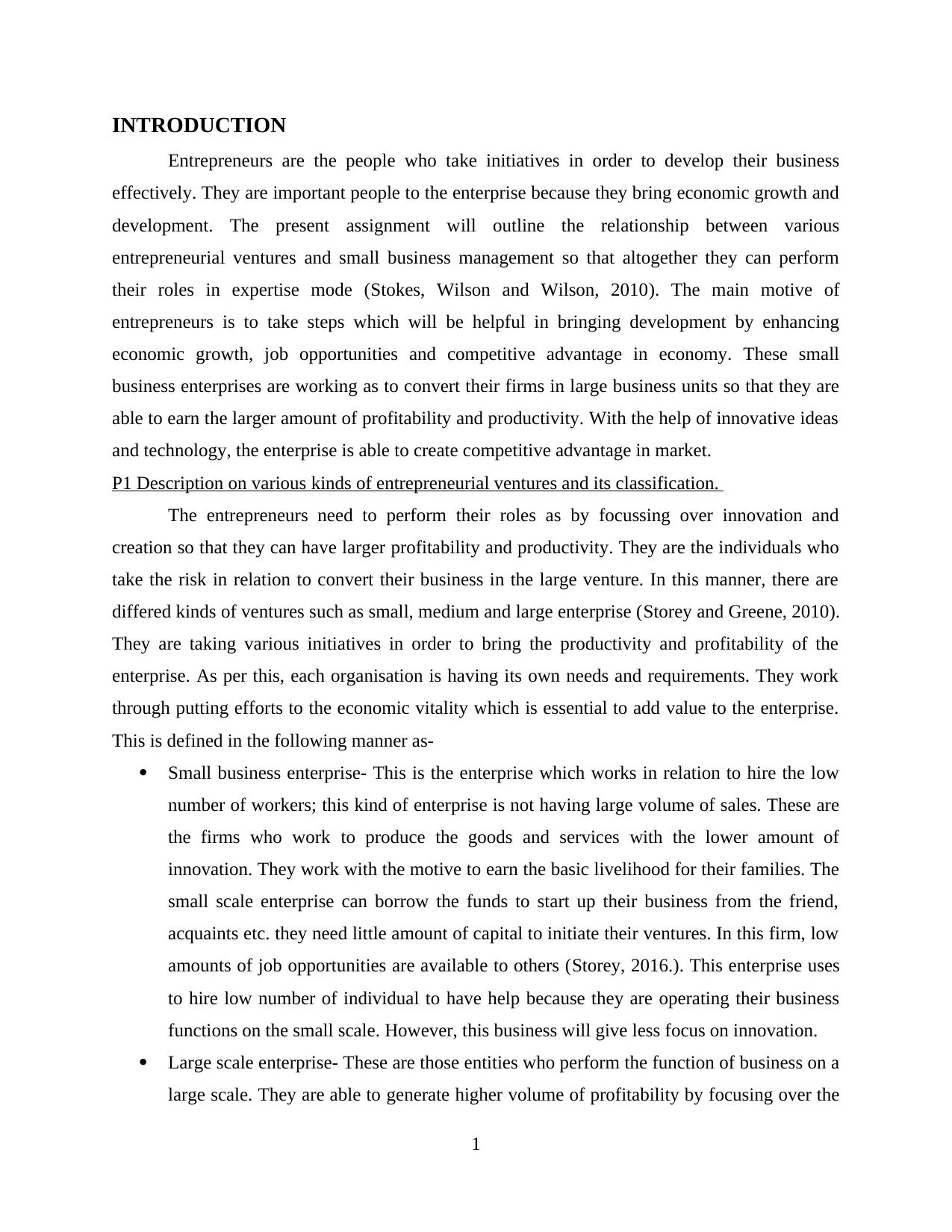
INTRODUCTION
Entrepreneurs are the people who take initiatives in order to develop their business
effectively. They are important people to the enterprise because they bring economic growth and
development. The present assignment will outline the relationship between various
entrepreneurial ventures and small business management so that altogether they can perform
their roles in expertise mode (Stokes, Wilson and Wilson, 2010). The main motive of
entrepreneurs is to take steps which will be helpful in bringing development by enhancing
economic growth, job opportunities and competitive advantage in economy. These small
business enterprises are working as to convert their firms in large business units so that they are
able to earn the larger amount of profitability and productivity. With the help of innovative ideas
and technology, the enterprise is able to create competitive advantage in market.
P1 Description on various kinds of entrepreneurial ventures and its classification.
The entrepreneurs need to perform their roles as by focussing over innovation and
creation so that they can have larger profitability and productivity. They are the individuals who
take the risk in relation to convert their business in the large venture. In this manner, there are
differed kinds of ventures such as small, medium and large enterprise (Storey and Greene, 2010).
They are taking various initiatives in order to bring the productivity and profitability of the
enterprise. As per this, each organisation is having its own needs and requirements. They work
through putting efforts to the economic vitality which is essential to add value to the enterprise.
This is defined in the following manner as-
Small business enterprise- This is the enterprise which works in relation to hire the low
number of workers; this kind of enterprise is not having large volume of sales. These are
the firms who work to produce the goods and services with the lower amount of
innovation. They work with the motive to earn the basic livelihood for their families. The
small scale enterprise can borrow the funds to start up their business from the friend,
acquaints etc. they need little amount of capital to initiate their ventures. In this firm, low
amounts of job opportunities are available to others (Storey, 2016.). This enterprise uses
to hire low number of individual to have help because they are operating their business
functions on the small scale. However, this business will give less focus on innovation.
Large scale enterprise- These are those entities who perform the function of business on a
large scale. They are able to generate higher volume of profitability by focusing over the
1
Entrepreneurs are the people who take initiatives in order to develop their business
effectively. They are important people to the enterprise because they bring economic growth and
development. The present assignment will outline the relationship between various
entrepreneurial ventures and small business management so that altogether they can perform
their roles in expertise mode (Stokes, Wilson and Wilson, 2010). The main motive of
entrepreneurs is to take steps which will be helpful in bringing development by enhancing
economic growth, job opportunities and competitive advantage in economy. These small
business enterprises are working as to convert their firms in large business units so that they are
able to earn the larger amount of profitability and productivity. With the help of innovative ideas
and technology, the enterprise is able to create competitive advantage in market.
P1 Description on various kinds of entrepreneurial ventures and its classification.
The entrepreneurs need to perform their roles as by focussing over innovation and
creation so that they can have larger profitability and productivity. They are the individuals who
take the risk in relation to convert their business in the large venture. In this manner, there are
differed kinds of ventures such as small, medium and large enterprise (Storey and Greene, 2010).
They are taking various initiatives in order to bring the productivity and profitability of the
enterprise. As per this, each organisation is having its own needs and requirements. They work
through putting efforts to the economic vitality which is essential to add value to the enterprise.
This is defined in the following manner as-
Small business enterprise- This is the enterprise which works in relation to hire the low
number of workers; this kind of enterprise is not having large volume of sales. These are
the firms who work to produce the goods and services with the lower amount of
innovation. They work with the motive to earn the basic livelihood for their families. The
small scale enterprise can borrow the funds to start up their business from the friend,
acquaints etc. they need little amount of capital to initiate their ventures. In this firm, low
amounts of job opportunities are available to others (Storey, 2016.). This enterprise uses
to hire low number of individual to have help because they are operating their business
functions on the small scale. However, this business will give less focus on innovation.
Large scale enterprise- These are those entities who perform the function of business on a
large scale. They are able to generate higher volume of profitability by focusing over the
1
⊘ This is a preview!⊘
Do you want full access?
Subscribe today to unlock all pages.

Trusted by 1+ million students worldwide
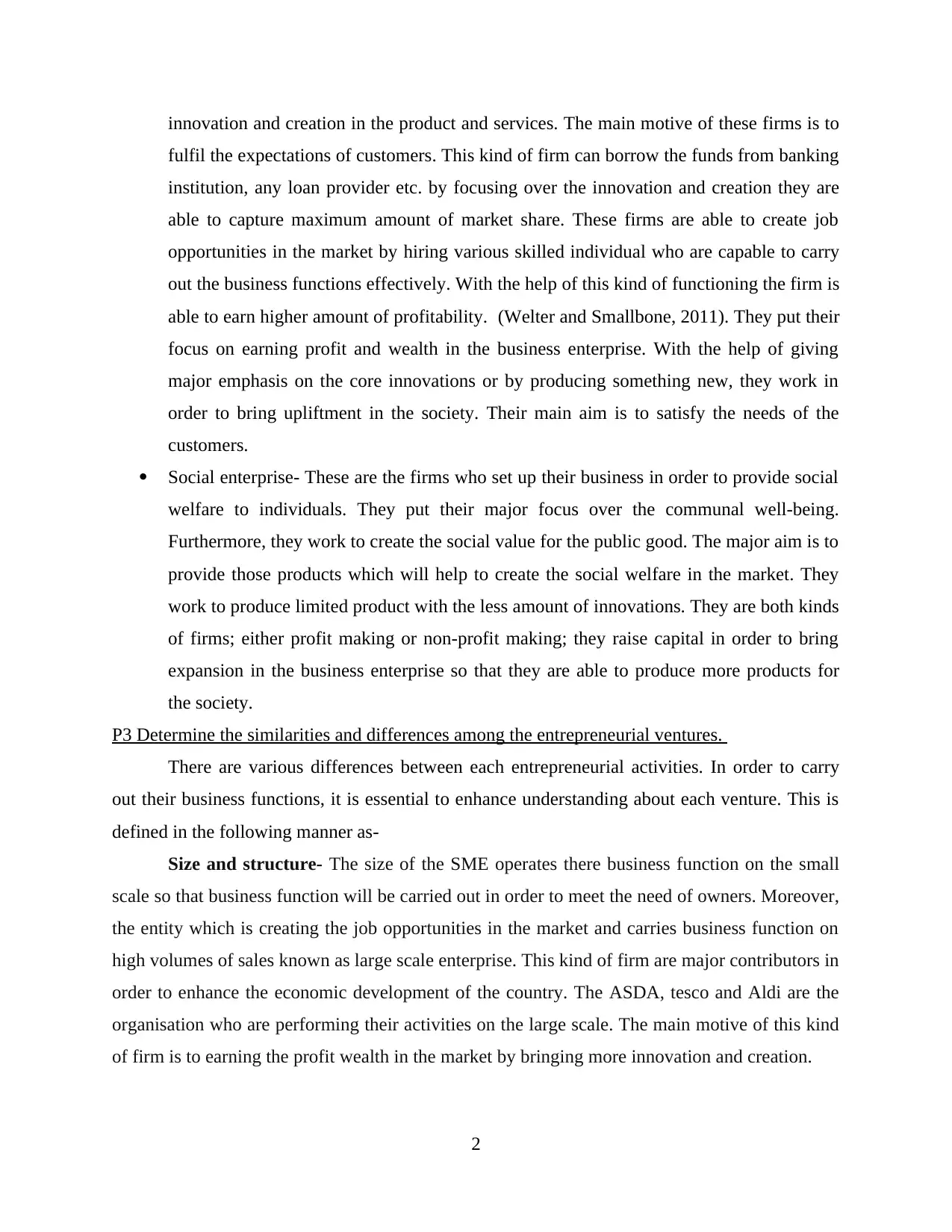
innovation and creation in the product and services. The main motive of these firms is to
fulfil the expectations of customers. This kind of firm can borrow the funds from banking
institution, any loan provider etc. by focusing over the innovation and creation they are
able to capture maximum amount of market share. These firms are able to create job
opportunities in the market by hiring various skilled individual who are capable to carry
out the business functions effectively. With the help of this kind of functioning the firm is
able to earn higher amount of profitability. (Welter and Smallbone, 2011). They put their
focus on earning profit and wealth in the business enterprise. With the help of giving
major emphasis on the core innovations or by producing something new, they work in
order to bring upliftment in the society. Their main aim is to satisfy the needs of the
customers.
Social enterprise- These are the firms who set up their business in order to provide social
welfare to individuals. They put their major focus over the communal well-being.
Furthermore, they work to create the social value for the public good. The major aim is to
provide those products which will help to create the social welfare in the market. They
work to produce limited product with the less amount of innovations. They are both kinds
of firms; either profit making or non-profit making; they raise capital in order to bring
expansion in the business enterprise so that they are able to produce more products for
the society.
P3 Determine the similarities and differences among the entrepreneurial ventures.
There are various differences between each entrepreneurial activities. In order to carry
out their business functions, it is essential to enhance understanding about each venture. This is
defined in the following manner as-
Size and structure- The size of the SME operates there business function on the small
scale so that business function will be carried out in order to meet the need of owners. Moreover,
the entity which is creating the job opportunities in the market and carries business function on
high volumes of sales known as large scale enterprise. This kind of firm are major contributors in
order to enhance the economic development of the country. The ASDA, tesco and Aldi are the
organisation who are performing their activities on the large scale. The main motive of this kind
of firm is to earning the profit wealth in the market by bringing more innovation and creation.
2
fulfil the expectations of customers. This kind of firm can borrow the funds from banking
institution, any loan provider etc. by focusing over the innovation and creation they are
able to capture maximum amount of market share. These firms are able to create job
opportunities in the market by hiring various skilled individual who are capable to carry
out the business functions effectively. With the help of this kind of functioning the firm is
able to earn higher amount of profitability. (Welter and Smallbone, 2011). They put their
focus on earning profit and wealth in the business enterprise. With the help of giving
major emphasis on the core innovations or by producing something new, they work in
order to bring upliftment in the society. Their main aim is to satisfy the needs of the
customers.
Social enterprise- These are the firms who set up their business in order to provide social
welfare to individuals. They put their major focus over the communal well-being.
Furthermore, they work to create the social value for the public good. The major aim is to
provide those products which will help to create the social welfare in the market. They
work to produce limited product with the less amount of innovations. They are both kinds
of firms; either profit making or non-profit making; they raise capital in order to bring
expansion in the business enterprise so that they are able to produce more products for
the society.
P3 Determine the similarities and differences among the entrepreneurial ventures.
There are various differences between each entrepreneurial activities. In order to carry
out their business functions, it is essential to enhance understanding about each venture. This is
defined in the following manner as-
Size and structure- The size of the SME operates there business function on the small
scale so that business function will be carried out in order to meet the need of owners. Moreover,
the entity which is creating the job opportunities in the market and carries business function on
high volumes of sales known as large scale enterprise. This kind of firm are major contributors in
order to enhance the economic development of the country. The ASDA, tesco and Aldi are the
organisation who are performing their activities on the large scale. The main motive of this kind
of firm is to earning the profit wealth in the market by bringing more innovation and creation.
2
Paraphrase This Document
Need a fresh take? Get an instant paraphrase of this document with our AI Paraphraser
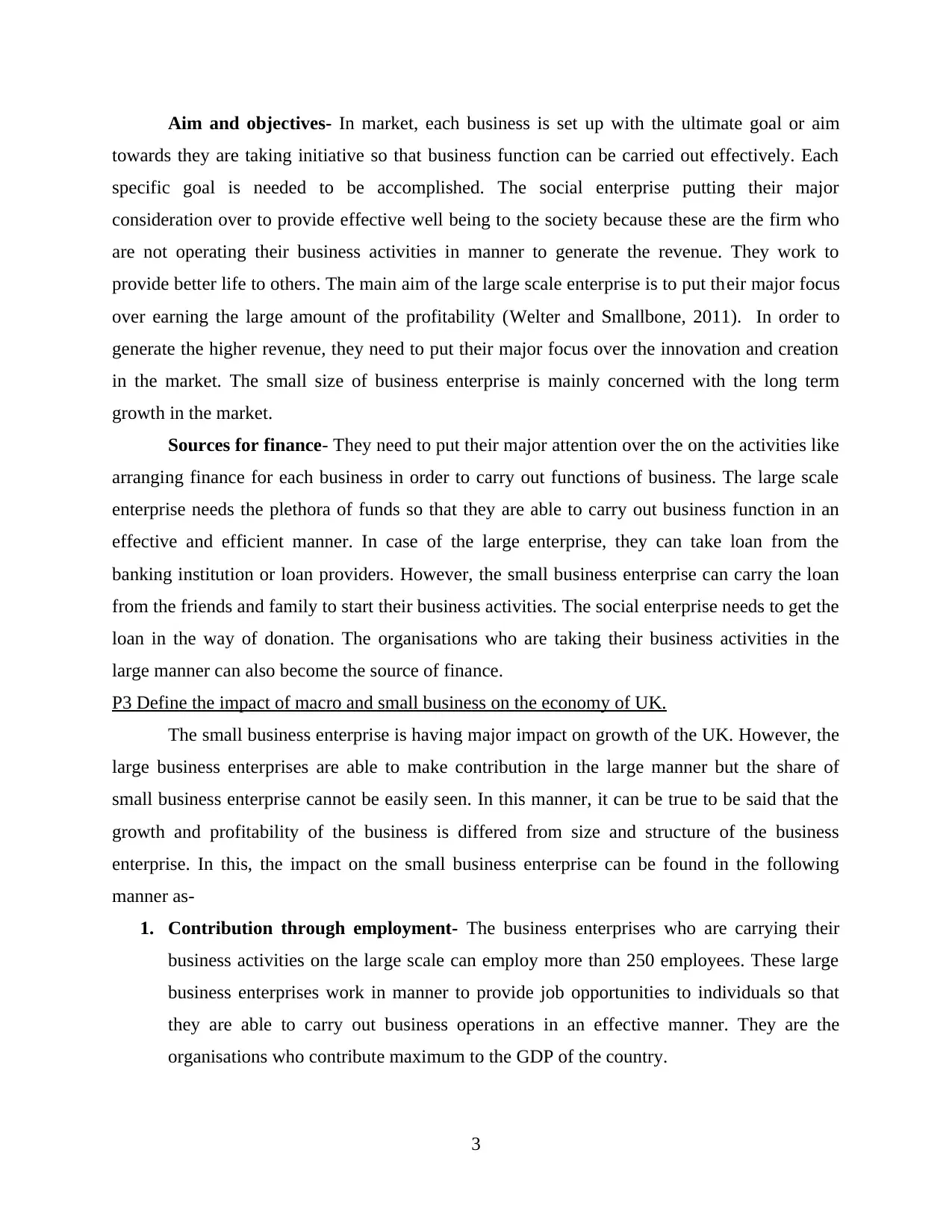
Aim and objectives- In market, each business is set up with the ultimate goal or aim
towards they are taking initiative so that business function can be carried out effectively. Each
specific goal is needed to be accomplished. The social enterprise putting their major
consideration over to provide effective well being to the society because these are the firm who
are not operating their business activities in manner to generate the revenue. They work to
provide better life to others. The main aim of the large scale enterprise is to put their major focus
over earning the large amount of the profitability (Welter and Smallbone, 2011). In order to
generate the higher revenue, they need to put their major focus over the innovation and creation
in the market. The small size of business enterprise is mainly concerned with the long term
growth in the market.
Sources for finance- They need to put their major attention over the on the activities like
arranging finance for each business in order to carry out functions of business. The large scale
enterprise needs the plethora of funds so that they are able to carry out business function in an
effective and efficient manner. In case of the large enterprise, they can take loan from the
banking institution or loan providers. However, the small business enterprise can carry the loan
from the friends and family to start their business activities. The social enterprise needs to get the
loan in the way of donation. The organisations who are taking their business activities in the
large manner can also become the source of finance.
P3 Define the impact of macro and small business on the economy of UK.
The small business enterprise is having major impact on growth of the UK. However, the
large business enterprises are able to make contribution in the large manner but the share of
small business enterprise cannot be easily seen. In this manner, it can be true to be said that the
growth and profitability of the business is differed from size and structure of the business
enterprise. In this, the impact on the small business enterprise can be found in the following
manner as-
1. Contribution through employment- The business enterprises who are carrying their
business activities on the large scale can employ more than 250 employees. These large
business enterprises work in manner to provide job opportunities to individuals so that
they are able to carry out business operations in an effective manner. They are the
organisations who contribute maximum to the GDP of the country.
3
towards they are taking initiative so that business function can be carried out effectively. Each
specific goal is needed to be accomplished. The social enterprise putting their major
consideration over to provide effective well being to the society because these are the firm who
are not operating their business activities in manner to generate the revenue. They work to
provide better life to others. The main aim of the large scale enterprise is to put their major focus
over earning the large amount of the profitability (Welter and Smallbone, 2011). In order to
generate the higher revenue, they need to put their major focus over the innovation and creation
in the market. The small size of business enterprise is mainly concerned with the long term
growth in the market.
Sources for finance- They need to put their major attention over the on the activities like
arranging finance for each business in order to carry out functions of business. The large scale
enterprise needs the plethora of funds so that they are able to carry out business function in an
effective and efficient manner. In case of the large enterprise, they can take loan from the
banking institution or loan providers. However, the small business enterprise can carry the loan
from the friends and family to start their business activities. The social enterprise needs to get the
loan in the way of donation. The organisations who are taking their business activities in the
large manner can also become the source of finance.
P3 Define the impact of macro and small business on the economy of UK.
The small business enterprise is having major impact on growth of the UK. However, the
large business enterprises are able to make contribution in the large manner but the share of
small business enterprise cannot be easily seen. In this manner, it can be true to be said that the
growth and profitability of the business is differed from size and structure of the business
enterprise. In this, the impact on the small business enterprise can be found in the following
manner as-
1. Contribution through employment- The business enterprises who are carrying their
business activities on the large scale can employ more than 250 employees. These large
business enterprises work in manner to provide job opportunities to individuals so that
they are able to carry out business operations in an effective manner. They are the
organisations who contribute maximum to the GDP of the country.
3
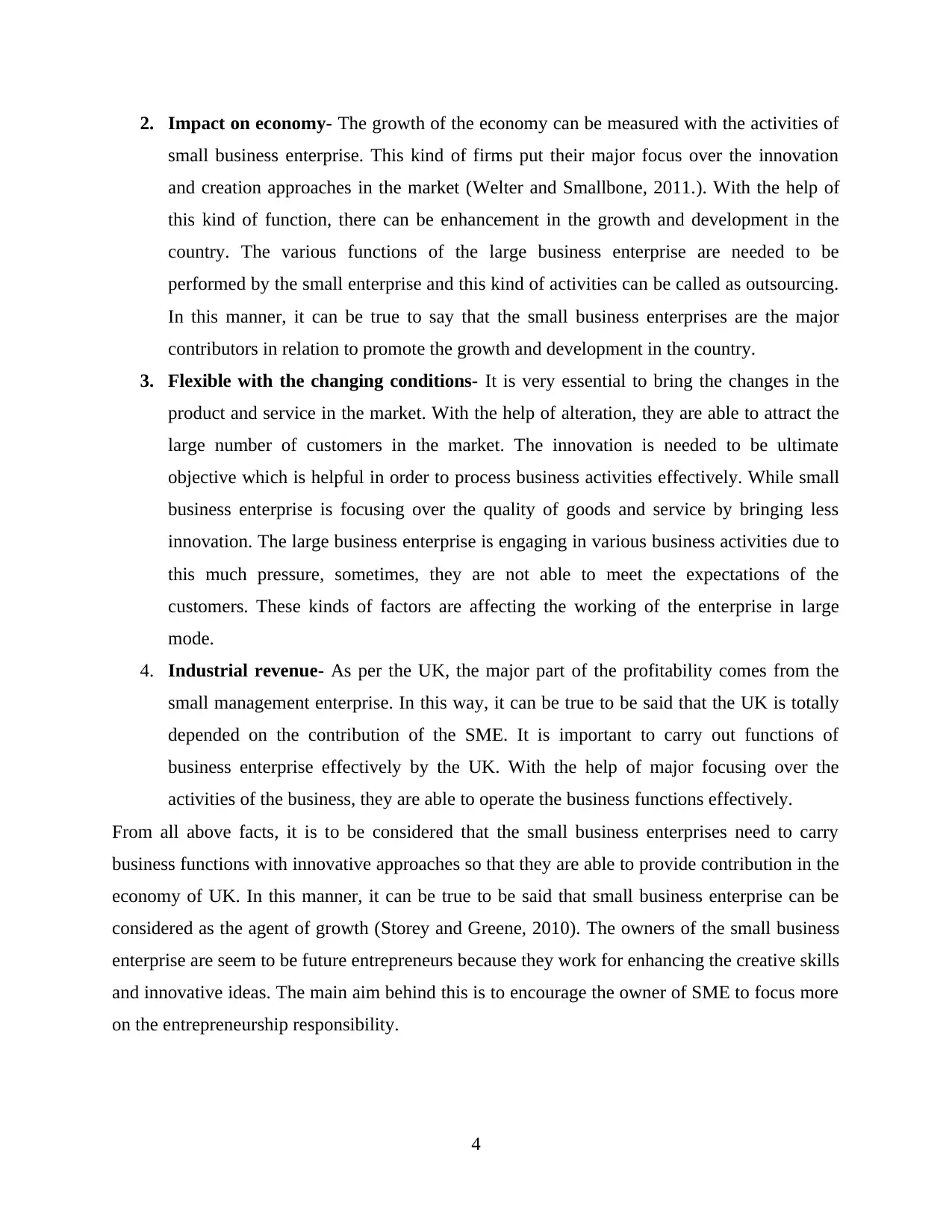
2. Impact on economy- The growth of the economy can be measured with the activities of
small business enterprise. This kind of firms put their major focus over the innovation
and creation approaches in the market (Welter and Smallbone, 2011.). With the help of
this kind of function, there can be enhancement in the growth and development in the
country. The various functions of the large business enterprise are needed to be
performed by the small enterprise and this kind of activities can be called as outsourcing.
In this manner, it can be true to say that the small business enterprises are the major
contributors in relation to promote the growth and development in the country.
3. Flexible with the changing conditions- It is very essential to bring the changes in the
product and service in the market. With the help of alteration, they are able to attract the
large number of customers in the market. The innovation is needed to be ultimate
objective which is helpful in order to process business activities effectively. While small
business enterprise is focusing over the quality of goods and service by bringing less
innovation. The large business enterprise is engaging in various business activities due to
this much pressure, sometimes, they are not able to meet the expectations of the
customers. These kinds of factors are affecting the working of the enterprise in large
mode.
4. Industrial revenue- As per the UK, the major part of the profitability comes from the
small management enterprise. In this way, it can be true to be said that the UK is totally
depended on the contribution of the SME. It is important to carry out functions of
business enterprise effectively by the UK. With the help of major focusing over the
activities of the business, they are able to operate the business functions effectively.
From all above facts, it is to be considered that the small business enterprises need to carry
business functions with innovative approaches so that they are able to provide contribution in the
economy of UK. In this manner, it can be true to be said that small business enterprise can be
considered as the agent of growth (Storey and Greene, 2010). The owners of the small business
enterprise are seem to be future entrepreneurs because they work for enhancing the creative skills
and innovative ideas. The main aim behind this is to encourage the owner of SME to focus more
on the entrepreneurship responsibility.
4
small business enterprise. This kind of firms put their major focus over the innovation
and creation approaches in the market (Welter and Smallbone, 2011.). With the help of
this kind of function, there can be enhancement in the growth and development in the
country. The various functions of the large business enterprise are needed to be
performed by the small enterprise and this kind of activities can be called as outsourcing.
In this manner, it can be true to say that the small business enterprises are the major
contributors in relation to promote the growth and development in the country.
3. Flexible with the changing conditions- It is very essential to bring the changes in the
product and service in the market. With the help of alteration, they are able to attract the
large number of customers in the market. The innovation is needed to be ultimate
objective which is helpful in order to process business activities effectively. While small
business enterprise is focusing over the quality of goods and service by bringing less
innovation. The large business enterprise is engaging in various business activities due to
this much pressure, sometimes, they are not able to meet the expectations of the
customers. These kinds of factors are affecting the working of the enterprise in large
mode.
4. Industrial revenue- As per the UK, the major part of the profitability comes from the
small management enterprise. In this way, it can be true to be said that the UK is totally
depended on the contribution of the SME. It is important to carry out functions of
business enterprise effectively by the UK. With the help of major focusing over the
activities of the business, they are able to operate the business functions effectively.
From all above facts, it is to be considered that the small business enterprises need to carry
business functions with innovative approaches so that they are able to provide contribution in the
economy of UK. In this manner, it can be true to be said that small business enterprise can be
considered as the agent of growth (Storey and Greene, 2010). The owners of the small business
enterprise are seem to be future entrepreneurs because they work for enhancing the creative skills
and innovative ideas. The main aim behind this is to encourage the owner of SME to focus more
on the entrepreneurship responsibility.
4
⊘ This is a preview!⊘
Do you want full access?
Subscribe today to unlock all pages.

Trusted by 1+ million students worldwide
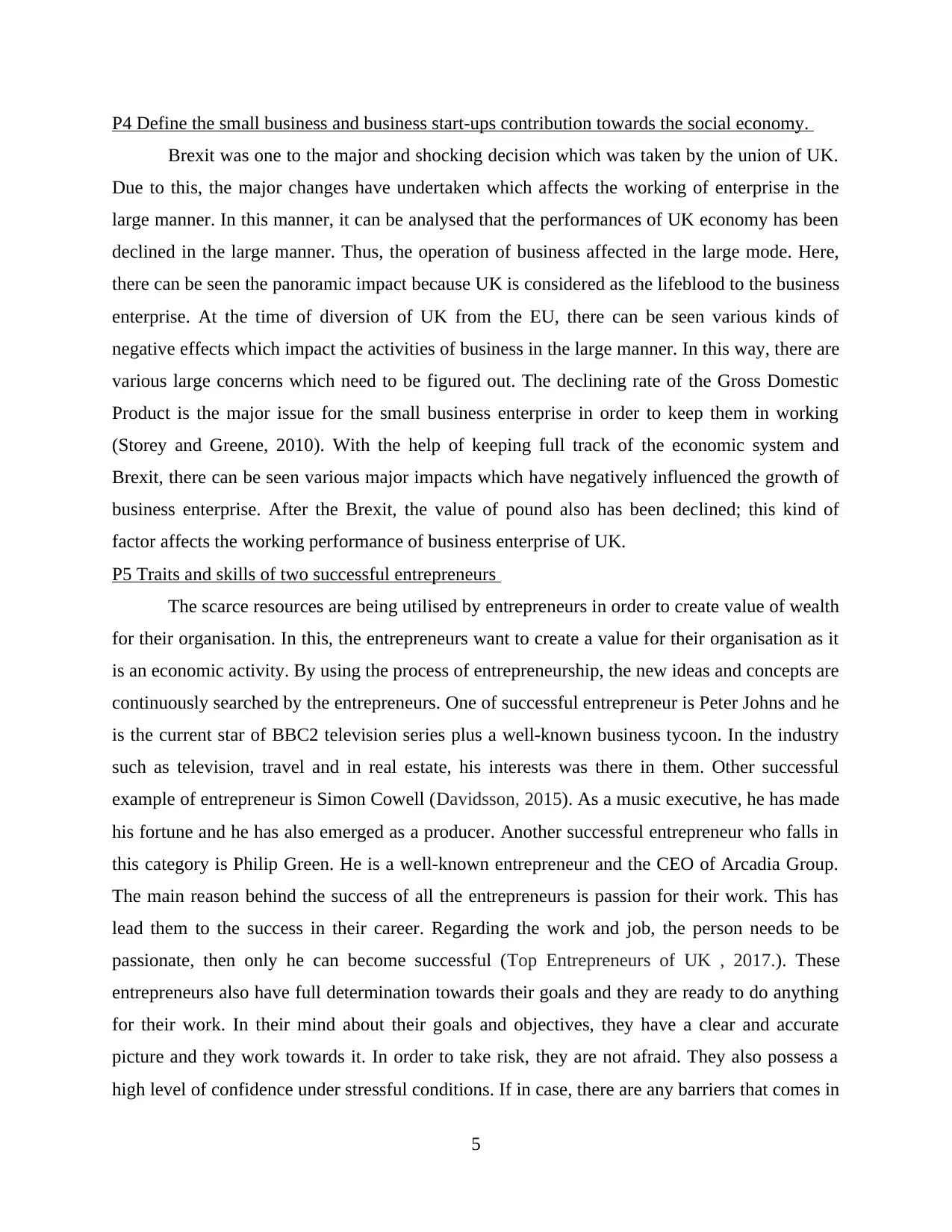
P4 Define the small business and business start-ups contribution towards the social economy.
Brexit was one to the major and shocking decision which was taken by the union of UK.
Due to this, the major changes have undertaken which affects the working of enterprise in the
large manner. In this manner, it can be analysed that the performances of UK economy has been
declined in the large manner. Thus, the operation of business affected in the large mode. Here,
there can be seen the panoramic impact because UK is considered as the lifeblood to the business
enterprise. At the time of diversion of UK from the EU, there can be seen various kinds of
negative effects which impact the activities of business in the large manner. In this way, there are
various large concerns which need to be figured out. The declining rate of the Gross Domestic
Product is the major issue for the small business enterprise in order to keep them in working
(Storey and Greene, 2010). With the help of keeping full track of the economic system and
Brexit, there can be seen various major impacts which have negatively influenced the growth of
business enterprise. After the Brexit, the value of pound also has been declined; this kind of
factor affects the working performance of business enterprise of UK.
P5 Traits and skills of two successful entrepreneurs
The scarce resources are being utilised by entrepreneurs in order to create value of wealth
for their organisation. In this, the entrepreneurs want to create a value for their organisation as it
is an economic activity. By using the process of entrepreneurship, the new ideas and concepts are
continuously searched by the entrepreneurs. One of successful entrepreneur is Peter Johns and he
is the current star of BBC2 television series plus a well-known business tycoon. In the industry
such as television, travel and in real estate, his interests was there in them. Other successful
example of entrepreneur is Simon Cowell (Davidsson, 2015). As a music executive, he has made
his fortune and he has also emerged as a producer. Another successful entrepreneur who falls in
this category is Philip Green. He is a well-known entrepreneur and the CEO of Arcadia Group.
The main reason behind the success of all the entrepreneurs is passion for their work. This has
lead them to the success in their career. Regarding the work and job, the person needs to be
passionate, then only he can become successful (Top Entrepreneurs of UK , 2017.). These
entrepreneurs also have full determination towards their goals and they are ready to do anything
for their work. In their mind about their goals and objectives, they have a clear and accurate
picture and they work towards it. In order to take risk, they are not afraid. They also possess a
high level of confidence under stressful conditions. If in case, there are any barriers that comes in
5
Brexit was one to the major and shocking decision which was taken by the union of UK.
Due to this, the major changes have undertaken which affects the working of enterprise in the
large manner. In this manner, it can be analysed that the performances of UK economy has been
declined in the large manner. Thus, the operation of business affected in the large mode. Here,
there can be seen the panoramic impact because UK is considered as the lifeblood to the business
enterprise. At the time of diversion of UK from the EU, there can be seen various kinds of
negative effects which impact the activities of business in the large manner. In this way, there are
various large concerns which need to be figured out. The declining rate of the Gross Domestic
Product is the major issue for the small business enterprise in order to keep them in working
(Storey and Greene, 2010). With the help of keeping full track of the economic system and
Brexit, there can be seen various major impacts which have negatively influenced the growth of
business enterprise. After the Brexit, the value of pound also has been declined; this kind of
factor affects the working performance of business enterprise of UK.
P5 Traits and skills of two successful entrepreneurs
The scarce resources are being utilised by entrepreneurs in order to create value of wealth
for their organisation. In this, the entrepreneurs want to create a value for their organisation as it
is an economic activity. By using the process of entrepreneurship, the new ideas and concepts are
continuously searched by the entrepreneurs. One of successful entrepreneur is Peter Johns and he
is the current star of BBC2 television series plus a well-known business tycoon. In the industry
such as television, travel and in real estate, his interests was there in them. Other successful
example of entrepreneur is Simon Cowell (Davidsson, 2015). As a music executive, he has made
his fortune and he has also emerged as a producer. Another successful entrepreneur who falls in
this category is Philip Green. He is a well-known entrepreneur and the CEO of Arcadia Group.
The main reason behind the success of all the entrepreneurs is passion for their work. This has
lead them to the success in their career. Regarding the work and job, the person needs to be
passionate, then only he can become successful (Top Entrepreneurs of UK , 2017.). These
entrepreneurs also have full determination towards their goals and they are ready to do anything
for their work. In their mind about their goals and objectives, they have a clear and accurate
picture and they work towards it. In order to take risk, they are not afraid. They also possess a
high level of confidence under stressful conditions. If in case, there are any barriers that comes in
5
Paraphrase This Document
Need a fresh take? Get an instant paraphrase of this document with our AI Paraphraser

their way, then they don't get upset instead they work towards it and thinks that all the hard work
that is done by them will pay them back one day. They also have a positive mind-set towards
their work and think that they will become successful in their work. By them the hard work is
done which have led to this success. They believed in continuous learning as this will keep their
mind sharp. In order to keep themselves updated about the latest trends in the market books,
journals etc. are being read by them. About any failure, they do not care they just want to learn
from their mistakes and try not to prepare the same mistakes next time. The above mentioned
entrepreneurs do not believe in the concept of giving up easily, they don't quit and they want to
try to give their best until the goals that are set by them are achieved (Eckhardt and Shane, 2013).
M3 Different lines of arguments affiliated to characteristics of entrepreneurs
The characteristics and traits may differ for different entrepreneurs. The learning abilities
have led to this success for some entrepreneurs (Fayolle and Gailly, 2015). However, for some
entrepreneurs, the self-confidence to take their own decision and remain stick to those decisions
that are made has led to the success of their venture. The quality of good planner can be
possessed by the entrepreneurs as they will know how to plan out their work and job and
according to it, the help will be provided to them in order organise their work. The core
competencies of entrepreneurs are personality factors. The skills such as solving of problem,
proactive etc. are included in this. The entrepreneurs mainly want to develop innovative idea and
place that idea in the work they do (Choi and Majumdar, 2014). They mostly want to try
something new which is not done before. In doing something new they mostly believe and to
achieve the goals and objectives the new ideas is being applied by them to their business. By
entrepreneurs, the risk is also being taken in their business. In order to execute their plan and
idea, they try to take risk. They are also not afraid of risk and failures.
6
that is done by them will pay them back one day. They also have a positive mind-set towards
their work and think that they will become successful in their work. By them the hard work is
done which have led to this success. They believed in continuous learning as this will keep their
mind sharp. In order to keep themselves updated about the latest trends in the market books,
journals etc. are being read by them. About any failure, they do not care they just want to learn
from their mistakes and try not to prepare the same mistakes next time. The above mentioned
entrepreneurs do not believe in the concept of giving up easily, they don't quit and they want to
try to give their best until the goals that are set by them are achieved (Eckhardt and Shane, 2013).
M3 Different lines of arguments affiliated to characteristics of entrepreneurs
The characteristics and traits may differ for different entrepreneurs. The learning abilities
have led to this success for some entrepreneurs (Fayolle and Gailly, 2015). However, for some
entrepreneurs, the self-confidence to take their own decision and remain stick to those decisions
that are made has led to the success of their venture. The quality of good planner can be
possessed by the entrepreneurs as they will know how to plan out their work and job and
according to it, the help will be provided to them in order organise their work. The core
competencies of entrepreneurs are personality factors. The skills such as solving of problem,
proactive etc. are included in this. The entrepreneurs mainly want to develop innovative idea and
place that idea in the work they do (Choi and Majumdar, 2014). They mostly want to try
something new which is not done before. In doing something new they mostly believe and to
achieve the goals and objectives the new ideas is being applied by them to their business. By
entrepreneurs, the risk is also being taken in their business. In order to execute their plan and
idea, they try to take risk. They are also not afraid of risk and failures.
6
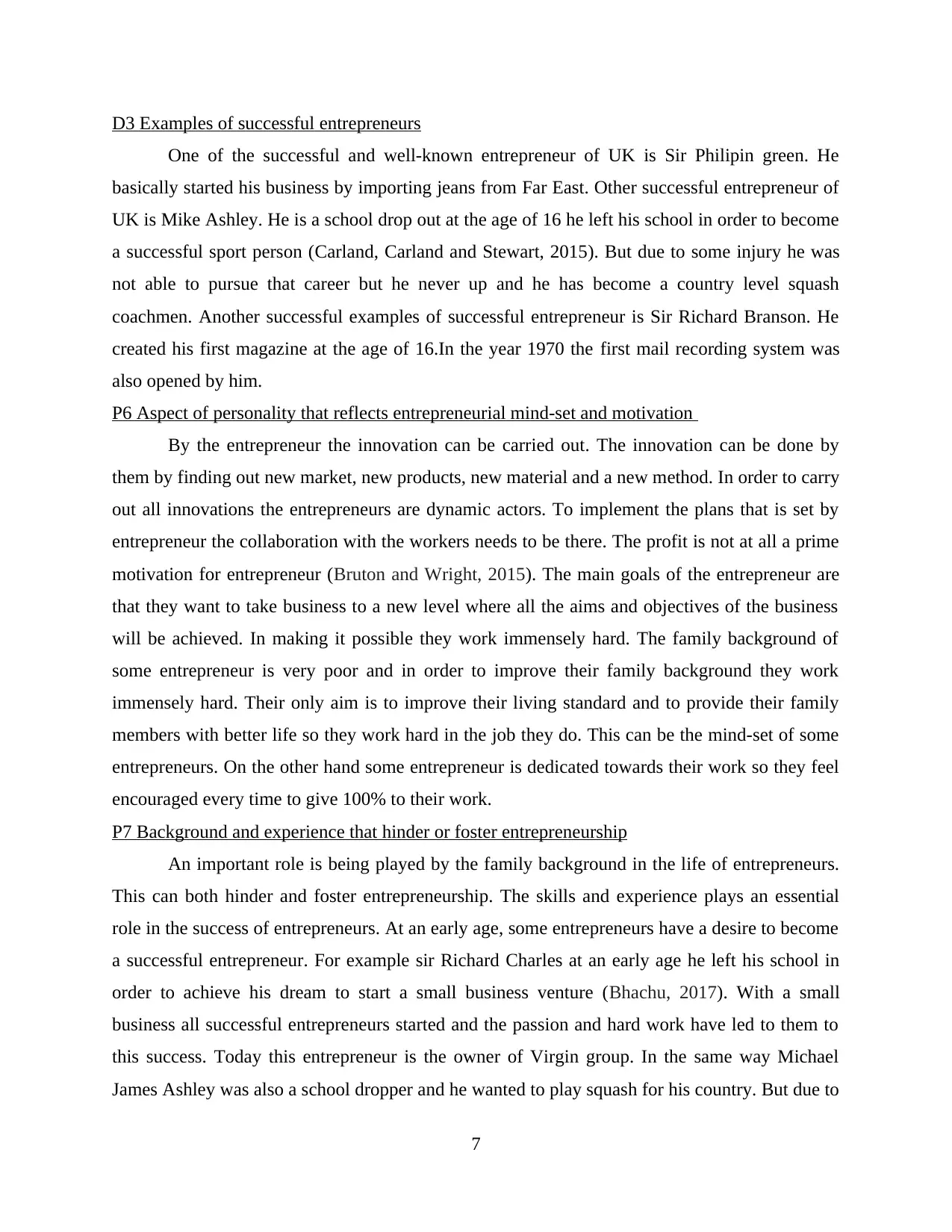
D3 Examples of successful entrepreneurs
One of the successful and well-known entrepreneur of UK is Sir Philipin green. He
basically started his business by importing jeans from Far East. Other successful entrepreneur of
UK is Mike Ashley. He is a school drop out at the age of 16 he left his school in order to become
a successful sport person (Carland, Carland and Stewart, 2015). But due to some injury he was
not able to pursue that career but he never up and he has become a country level squash
coachmen. Another successful examples of successful entrepreneur is Sir Richard Branson. He
created his first magazine at the age of 16.In the year 1970 the first mail recording system was
also opened by him.
P6 Aspect of personality that reflects entrepreneurial mind-set and motivation
By the entrepreneur the innovation can be carried out. The innovation can be done by
them by finding out new market, new products, new material and a new method. In order to carry
out all innovations the entrepreneurs are dynamic actors. To implement the plans that is set by
entrepreneur the collaboration with the workers needs to be there. The profit is not at all a prime
motivation for entrepreneur (Bruton and Wright, 2015). The main goals of the entrepreneur are
that they want to take business to a new level where all the aims and objectives of the business
will be achieved. In making it possible they work immensely hard. The family background of
some entrepreneur is very poor and in order to improve their family background they work
immensely hard. Their only aim is to improve their living standard and to provide their family
members with better life so they work hard in the job they do. This can be the mind-set of some
entrepreneurs. On the other hand some entrepreneur is dedicated towards their work so they feel
encouraged every time to give 100% to their work.
P7 Background and experience that hinder or foster entrepreneurship
An important role is being played by the family background in the life of entrepreneurs.
This can both hinder and foster entrepreneurship. The skills and experience plays an essential
role in the success of entrepreneurs. At an early age, some entrepreneurs have a desire to become
a successful entrepreneur. For example sir Richard Charles at an early age he left his school in
order to achieve his dream to start a small business venture (Bhachu, 2017). With a small
business all successful entrepreneurs started and the passion and hard work have led to them to
this success. Today this entrepreneur is the owner of Virgin group. In the same way Michael
James Ashley was also a school dropper and he wanted to play squash for his country. But due to
7
One of the successful and well-known entrepreneur of UK is Sir Philipin green. He
basically started his business by importing jeans from Far East. Other successful entrepreneur of
UK is Mike Ashley. He is a school drop out at the age of 16 he left his school in order to become
a successful sport person (Carland, Carland and Stewart, 2015). But due to some injury he was
not able to pursue that career but he never up and he has become a country level squash
coachmen. Another successful examples of successful entrepreneur is Sir Richard Branson. He
created his first magazine at the age of 16.In the year 1970 the first mail recording system was
also opened by him.
P6 Aspect of personality that reflects entrepreneurial mind-set and motivation
By the entrepreneur the innovation can be carried out. The innovation can be done by
them by finding out new market, new products, new material and a new method. In order to carry
out all innovations the entrepreneurs are dynamic actors. To implement the plans that is set by
entrepreneur the collaboration with the workers needs to be there. The profit is not at all a prime
motivation for entrepreneur (Bruton and Wright, 2015). The main goals of the entrepreneur are
that they want to take business to a new level where all the aims and objectives of the business
will be achieved. In making it possible they work immensely hard. The family background of
some entrepreneur is very poor and in order to improve their family background they work
immensely hard. Their only aim is to improve their living standard and to provide their family
members with better life so they work hard in the job they do. This can be the mind-set of some
entrepreneurs. On the other hand some entrepreneur is dedicated towards their work so they feel
encouraged every time to give 100% to their work.
P7 Background and experience that hinder or foster entrepreneurship
An important role is being played by the family background in the life of entrepreneurs.
This can both hinder and foster entrepreneurship. The skills and experience plays an essential
role in the success of entrepreneurs. At an early age, some entrepreneurs have a desire to become
a successful entrepreneur. For example sir Richard Charles at an early age he left his school in
order to achieve his dream to start a small business venture (Bhachu, 2017). With a small
business all successful entrepreneurs started and the passion and hard work have led to them to
this success. Today this entrepreneur is the owner of Virgin group. In the same way Michael
James Ashley was also a school dropper and he wanted to play squash for his country. But due to
7
⊘ This is a preview!⊘
Do you want full access?
Subscribe today to unlock all pages.

Trusted by 1+ million students worldwide
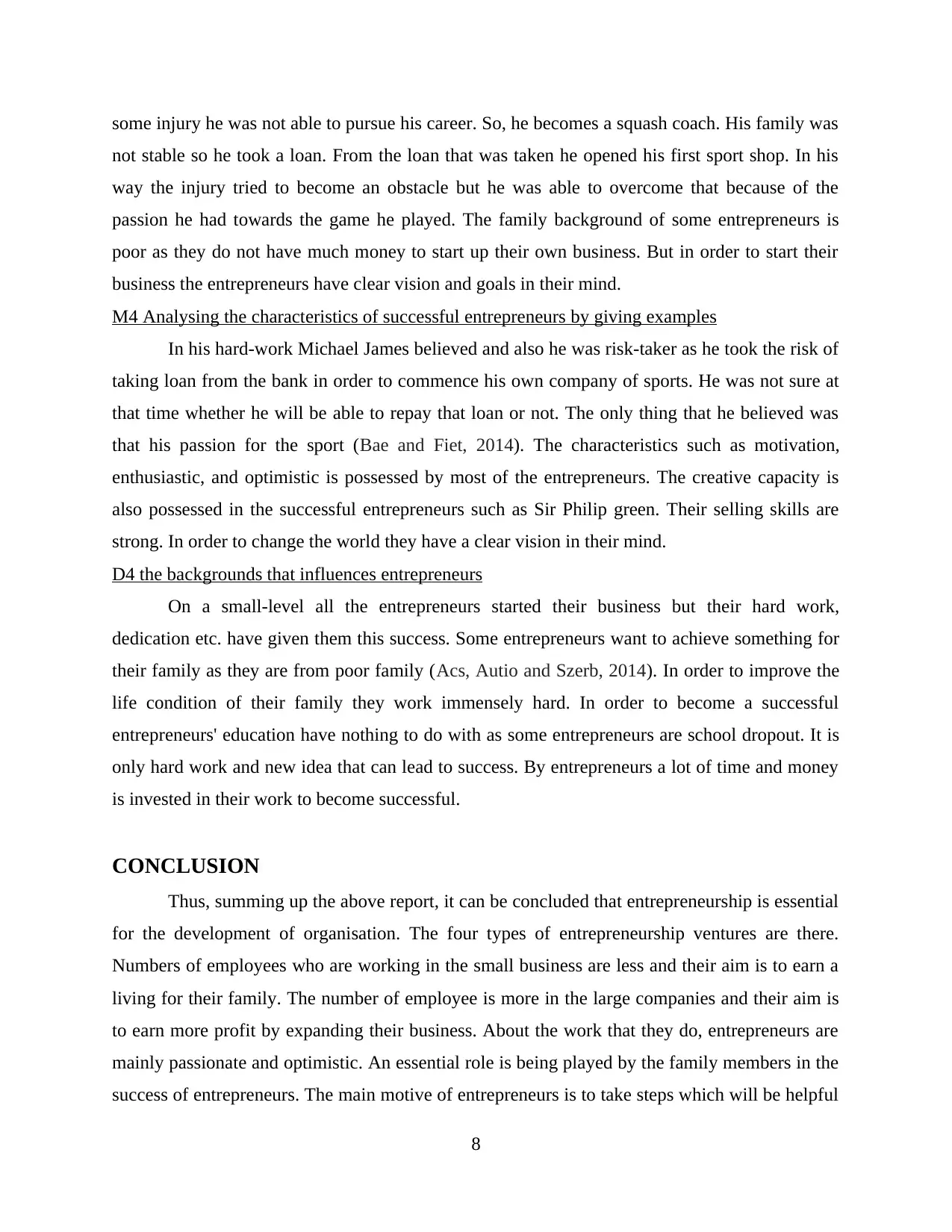
some injury he was not able to pursue his career. So, he becomes a squash coach. His family was
not stable so he took a loan. From the loan that was taken he opened his first sport shop. In his
way the injury tried to become an obstacle but he was able to overcome that because of the
passion he had towards the game he played. The family background of some entrepreneurs is
poor as they do not have much money to start up their own business. But in order to start their
business the entrepreneurs have clear vision and goals in their mind.
M4 Analysing the characteristics of successful entrepreneurs by giving examples
In his hard-work Michael James believed and also he was risk-taker as he took the risk of
taking loan from the bank in order to commence his own company of sports. He was not sure at
that time whether he will be able to repay that loan or not. The only thing that he believed was
that his passion for the sport (Bae and Fiet, 2014). The characteristics such as motivation,
enthusiastic, and optimistic is possessed by most of the entrepreneurs. The creative capacity is
also possessed in the successful entrepreneurs such as Sir Philip green. Their selling skills are
strong. In order to change the world they have a clear vision in their mind.
D4 the backgrounds that influences entrepreneurs
On a small-level all the entrepreneurs started their business but their hard work,
dedication etc. have given them this success. Some entrepreneurs want to achieve something for
their family as they are from poor family (Acs, Autio and Szerb, 2014). In order to improve the
life condition of their family they work immensely hard. In order to become a successful
entrepreneurs' education have nothing to do with as some entrepreneurs are school dropout. It is
only hard work and new idea that can lead to success. By entrepreneurs a lot of time and money
is invested in their work to become successful.
CONCLUSION
Thus, summing up the above report, it can be concluded that entrepreneurship is essential
for the development of organisation. The four types of entrepreneurship ventures are there.
Numbers of employees who are working in the small business are less and their aim is to earn a
living for their family. The number of employee is more in the large companies and their aim is
to earn more profit by expanding their business. About the work that they do, entrepreneurs are
mainly passionate and optimistic. An essential role is being played by the family members in the
success of entrepreneurs. The main motive of entrepreneurs is to take steps which will be helpful
8
not stable so he took a loan. From the loan that was taken he opened his first sport shop. In his
way the injury tried to become an obstacle but he was able to overcome that because of the
passion he had towards the game he played. The family background of some entrepreneurs is
poor as they do not have much money to start up their own business. But in order to start their
business the entrepreneurs have clear vision and goals in their mind.
M4 Analysing the characteristics of successful entrepreneurs by giving examples
In his hard-work Michael James believed and also he was risk-taker as he took the risk of
taking loan from the bank in order to commence his own company of sports. He was not sure at
that time whether he will be able to repay that loan or not. The only thing that he believed was
that his passion for the sport (Bae and Fiet, 2014). The characteristics such as motivation,
enthusiastic, and optimistic is possessed by most of the entrepreneurs. The creative capacity is
also possessed in the successful entrepreneurs such as Sir Philip green. Their selling skills are
strong. In order to change the world they have a clear vision in their mind.
D4 the backgrounds that influences entrepreneurs
On a small-level all the entrepreneurs started their business but their hard work,
dedication etc. have given them this success. Some entrepreneurs want to achieve something for
their family as they are from poor family (Acs, Autio and Szerb, 2014). In order to improve the
life condition of their family they work immensely hard. In order to become a successful
entrepreneurs' education have nothing to do with as some entrepreneurs are school dropout. It is
only hard work and new idea that can lead to success. By entrepreneurs a lot of time and money
is invested in their work to become successful.
CONCLUSION
Thus, summing up the above report, it can be concluded that entrepreneurship is essential
for the development of organisation. The four types of entrepreneurship ventures are there.
Numbers of employees who are working in the small business are less and their aim is to earn a
living for their family. The number of employee is more in the large companies and their aim is
to earn more profit by expanding their business. About the work that they do, entrepreneurs are
mainly passionate and optimistic. An essential role is being played by the family members in the
success of entrepreneurs. The main motive of entrepreneurs is to take steps which will be helpful
8
Paraphrase This Document
Need a fresh take? Get an instant paraphrase of this document with our AI Paraphraser

in bringing development by enhancing economic growth, job opportunities and competitive
advantage in economy. With the help of innovative ideas and technology, the enterprise is able to
create competitive advantage in market.
9
advantage in economy. With the help of innovative ideas and technology, the enterprise is able to
create competitive advantage in market.
9
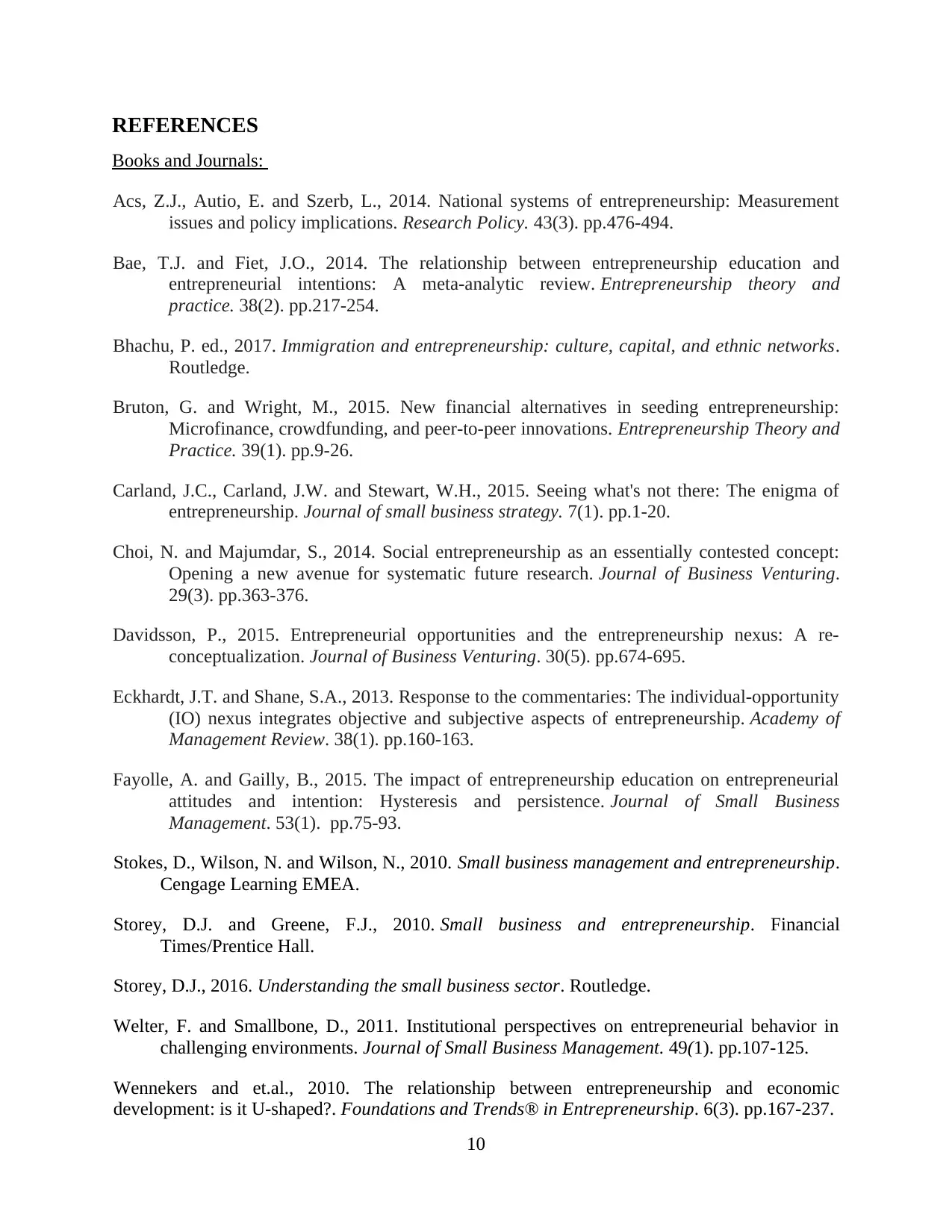
REFERENCES
Books and Journals:
Acs, Z.J., Autio, E. and Szerb, L., 2014. National systems of entrepreneurship: Measurement
issues and policy implications. Research Policy. 43(3). pp.476-494.
Bae, T.J. and Fiet, J.O., 2014. The relationship between entrepreneurship education and
entrepreneurial intentions: A meta‐analytic review. Entrepreneurship theory and
practice. 38(2). pp.217-254.
Bhachu, P. ed., 2017. Immigration and entrepreneurship: culture, capital, and ethnic networks.
Routledge.
Bruton, G. and Wright, M., 2015. New financial alternatives in seeding entrepreneurship:
Microfinance, crowdfunding, and peer‐to‐peer innovations. Entrepreneurship Theory and
Practice. 39(1). pp.9-26.
Carland, J.C., Carland, J.W. and Stewart, W.H., 2015. Seeing what's not there: The enigma of
entrepreneurship. Journal of small business strategy. 7(1). pp.1-20.
Choi, N. and Majumdar, S., 2014. Social entrepreneurship as an essentially contested concept:
Opening a new avenue for systematic future research. Journal of Business Venturing.
29(3). pp.363-376.
Davidsson, P., 2015. Entrepreneurial opportunities and the entrepreneurship nexus: A re-
conceptualization. Journal of Business Venturing. 30(5). pp.674-695.
Eckhardt, J.T. and Shane, S.A., 2013. Response to the commentaries: The individual-opportunity
(IO) nexus integrates objective and subjective aspects of entrepreneurship. Academy of
Management Review. 38(1). pp.160-163.
Fayolle, A. and Gailly, B., 2015. The impact of entrepreneurship education on entrepreneurial
attitudes and intention: Hysteresis and persistence. Journal of Small Business
Management. 53(1). pp.75-93.
Stokes, D., Wilson, N. and Wilson, N., 2010. Small business management and entrepreneurship.
Cengage Learning EMEA.
Storey, D.J. and Greene, F.J., 2010. Small business and entrepreneurship. Financial
Times/Prentice Hall.
Storey, D.J., 2016. Understanding the small business sector. Routledge.
Welter, F. and Smallbone, D., 2011. Institutional perspectives on entrepreneurial behavior in
challenging environments. Journal of Small Business Management. 49(1). pp.107-125.
Wennekers and et.al., 2010. The relationship between entrepreneurship and economic
development: is it U-shaped?. Foundations and Trends® in Entrepreneurship. 6(3). pp.167-237.
10
Books and Journals:
Acs, Z.J., Autio, E. and Szerb, L., 2014. National systems of entrepreneurship: Measurement
issues and policy implications. Research Policy. 43(3). pp.476-494.
Bae, T.J. and Fiet, J.O., 2014. The relationship between entrepreneurship education and
entrepreneurial intentions: A meta‐analytic review. Entrepreneurship theory and
practice. 38(2). pp.217-254.
Bhachu, P. ed., 2017. Immigration and entrepreneurship: culture, capital, and ethnic networks.
Routledge.
Bruton, G. and Wright, M., 2015. New financial alternatives in seeding entrepreneurship:
Microfinance, crowdfunding, and peer‐to‐peer innovations. Entrepreneurship Theory and
Practice. 39(1). pp.9-26.
Carland, J.C., Carland, J.W. and Stewart, W.H., 2015. Seeing what's not there: The enigma of
entrepreneurship. Journal of small business strategy. 7(1). pp.1-20.
Choi, N. and Majumdar, S., 2014. Social entrepreneurship as an essentially contested concept:
Opening a new avenue for systematic future research. Journal of Business Venturing.
29(3). pp.363-376.
Davidsson, P., 2015. Entrepreneurial opportunities and the entrepreneurship nexus: A re-
conceptualization. Journal of Business Venturing. 30(5). pp.674-695.
Eckhardt, J.T. and Shane, S.A., 2013. Response to the commentaries: The individual-opportunity
(IO) nexus integrates objective and subjective aspects of entrepreneurship. Academy of
Management Review. 38(1). pp.160-163.
Fayolle, A. and Gailly, B., 2015. The impact of entrepreneurship education on entrepreneurial
attitudes and intention: Hysteresis and persistence. Journal of Small Business
Management. 53(1). pp.75-93.
Stokes, D., Wilson, N. and Wilson, N., 2010. Small business management and entrepreneurship.
Cengage Learning EMEA.
Storey, D.J. and Greene, F.J., 2010. Small business and entrepreneurship. Financial
Times/Prentice Hall.
Storey, D.J., 2016. Understanding the small business sector. Routledge.
Welter, F. and Smallbone, D., 2011. Institutional perspectives on entrepreneurial behavior in
challenging environments. Journal of Small Business Management. 49(1). pp.107-125.
Wennekers and et.al., 2010. The relationship between entrepreneurship and economic
development: is it U-shaped?. Foundations and Trends® in Entrepreneurship. 6(3). pp.167-237.
10
⊘ This is a preview!⊘
Do you want full access?
Subscribe today to unlock all pages.

Trusted by 1+ million students worldwide
1 out of 13
Related Documents
Your All-in-One AI-Powered Toolkit for Academic Success.
+13062052269
info@desklib.com
Available 24*7 on WhatsApp / Email
![[object Object]](/_next/static/media/star-bottom.7253800d.svg)
Unlock your academic potential
Copyright © 2020–2026 A2Z Services. All Rights Reserved. Developed and managed by ZUCOL.




